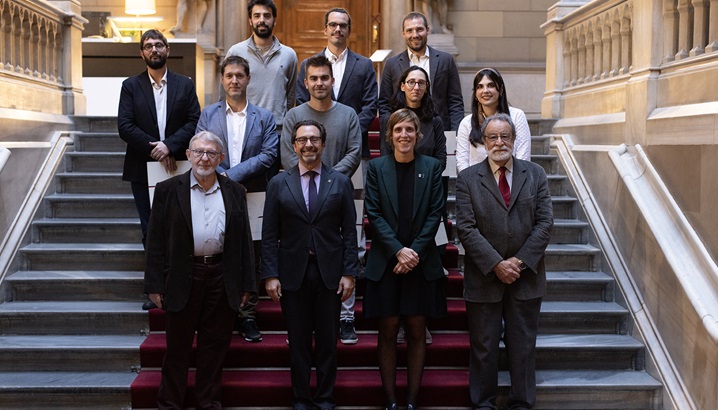The Antoni M. Badia i Margarit Awards for the best doctoral thesis written in Catalan are presented

The Aula Magna of the Historic Building hosted the third edition of the Antoni M. Badia and Margarit Awards for the best doctoral thesis written in Catalan. The event was presided over by the Rector, Joan Guàrdia, who also presented the awards, named in homage and memory of Antoni M. Badia Margarit, who was Rector of the University of Barcelona and an outstanding linguist.

The Aula Magna of the Historic Building hosted the third edition of the Antoni M. Badia and Margarit Awards for the best doctoral thesis written in Catalan. The event was presided over by the Rector, Joan Guàrdia, who also presented the awards, named in homage and memory of Antoni M. Badia Margarit, who was Rector of the University of Barcelona and an outstanding linguist.
In the conversation, moderated by Joan Santanach, the rector's delegate for Language Policy and Publications, the historical context, the signing of the manifesto, was brought up. “At that time there was a reflection on what had been done during the Republic: the Institut Escola, the Universitat Autònoma… We aimed to link up with the historical past to build a new society”, Camarasa recalled. “Those moments of resumption — added Folch — demanded the complete recovery of the language. Without scientific recovery, we would have created a biased culture”. They also recalled the day-to-day university life at that time: “we took the terminology from the class notes, which we were translating from Spanish”, recalled Camarasa. Both agreed that “without that work, what is being done today would not be possible, it would have no reference”. Folch concluded that writing a thesis in Catalan “is a key moment to show that you are capable and competent in the subject and in your own language”.
During the ceremony, the Vice-Rector for Doctoral Studies, Research Staff in Training and Talent Attraction, Maria Feliu, pointed out that, of the 742 doctoral theses that were presented at the UB last year, a total of 107 were in Catalan, thirteen more than the previous year. Of these, 59 theses were presented for the Antoni M. Badia and Margarit Awards, nine more than in the previous edition. This year, the winners in the different categories were as follows:
Best thesis in Catalan in the field of humanities and social sciences to “Ideologies lingüístiques en gramàtiques i diccionaris catalans del segle XIX”, by Eloi Bellés, and to “La filosofia de la traducció en Marcel Proust: transformar l’experiència en art”, by Valèria Gaillard.
Best thesis in Catalan in the field of Experimental and Health Sciences to “Anàlisi de les funcions de la proteïna NCAM2 en el desenvolupament i la plasticitat neuronal”, by Alba Ortega.
Best thesis in Catalan on gender equality and other sustainable development goals (SDGs) to “L’homonacionalisme a Europa: una mirada quantitativa des dels valors”, by Leon Freude.
Best action in Catalan for the dissemination of the doctoral thesis for “Envelliment i VIH. Creació i avaluació d’un sistema de comunicació digital (app) per millorar la qualitat de les cures de salut en persones majors de 60 anys infectades pel VIH”, by Jordi Puig.
The jury also agreed to award diplomas of recognition to the candidates for the finalist theses: Jaume Marcé, runner-up for the prize in the humanities and social sciences category, for “Pro succurrendo necessitatibus dicti hospitalis. Els orígens del patrimoni i els mecanismes de finançament de l’hospital de la Santa Creu de Barcelona (s. xv)”; Alejandro Lillo, runner-up for the prize in the experimental sciences and health sciences category, for “Potencial dels heteròmers de receptors d’adenosina i cannabinoides com a dianes terapèutiques en malalties neurodegeneratives i obesitat”, and Aleix Soler, runner-up for the prize in the experimental sciences and health sciences category, for “Utilitat del QuantiFERON®-TB Gold Plus en el diagnòstic de la infecció tuberculosa latent i la malaltia tuberculosa en població pediàtrica”.
During the ceremony, Alba Ortega and Eloi Bellés spoke on behalf of all the award winners. The Antoni M. Badia i Margarit Awards aim to promote the writing of theses in Catalan and, at the same time, to recognise research that considers sustainability, the gender perspective and the dissemination of knowledge.
